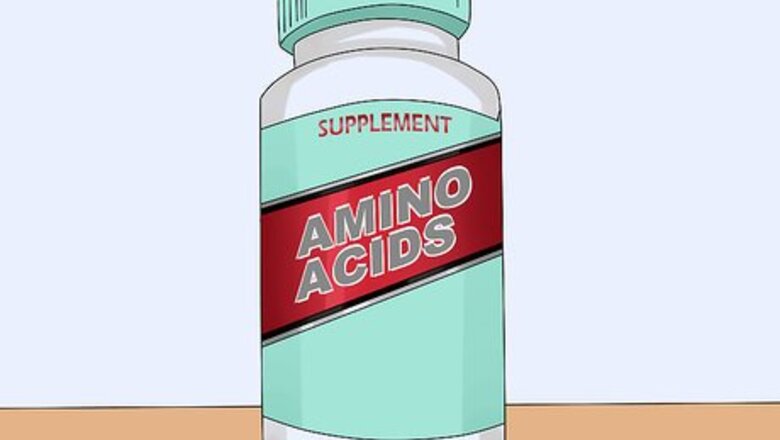
views
Encouraging Baby Hair Growth
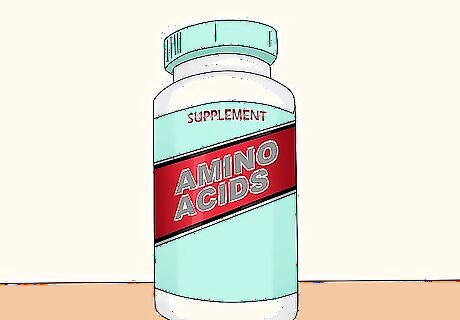
Take a daily supplement containing proteins or amino acids. These are some of the building blocks of healthy hair and can stimulate hair growth. Many supplements that use marine products, such as fish oil, as their primary ingredients are good for your hair, too. However, talk with your doctor before starting any supplementation. Read the directions on the supplement carefully and follow them closely. For example, some protein supplements actually require that you take them once in the morning and once at night.
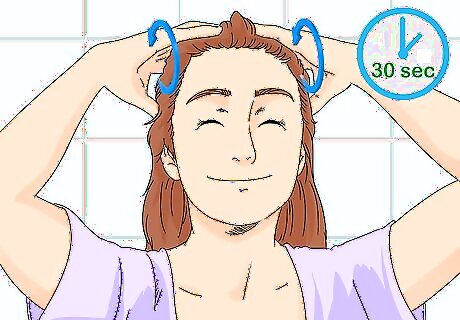
Massage your scalp for 30 seconds prior to showering. Place your fingers on your head and rotate them around while applying gentle pressure. Massage the front parts of your scalp where the baby hairs are growing. Continue massaging for at least 30 seconds each time and repeat as often as you like. Massaging your scalp boosts blood flow to the area, which can stimulate follicle health and hair growth. You can also pay for a professional scalp massage at a salon. If desired, add a few drops of an essential oil, such as rosemary, peppermint, or lavender to your scalp before massing it. This may help to promote hair growth.
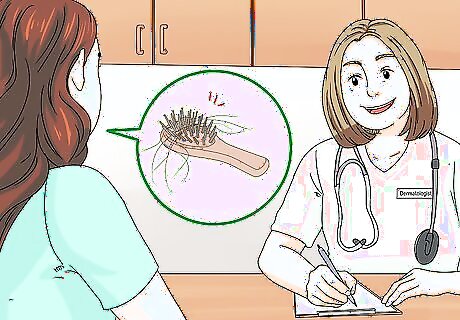
Talk with your dermatologist. If you are noticing increased hair loss or even an uptick in hair growth, then it’s possible that your hormones or a medication is to blame. Make an appointment with your dermatologist or primary care physician to discuss how to manage your hair growth in a healthy way. They might suggest medications or even laser therapy.
Repairing Hair Damage
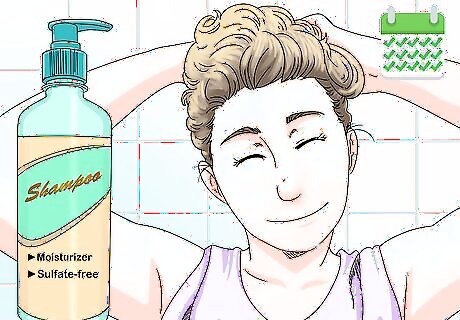
Use a moisturizing and sulfate-free shampoo on a daily basis. Look for a shampoo that contains quality ingredients, such as vitamins A, green tea, shea butter, and sunflower oil. Choosing a sulfate-free shampoo means that it has fewer harsh chemicals and detergents. If you have color treated hair, check that your shampoo states that it is “color-safe.” Read over and follow the usage instructions on the back of the shampoo bottle. You probably won’t need to change your shower routine other than switching products. A moisturizing shampoo can encourage hair growth, while also helping your baby hairs to lie down and avoid frizzing out.
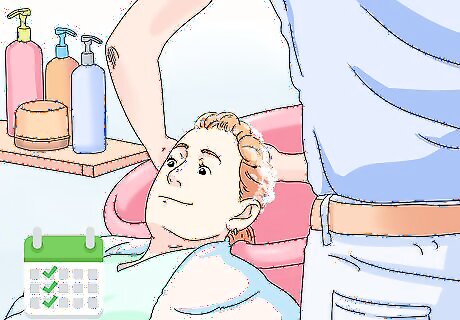
Do a deep conditioning hair treatment once a week. Unlike daily conditioners, a deep treatment penetrates directly into your hair shafts to provide nutrients. Apply the product from the root to the tip of your hair. Then, put on a shower cap or other cover to help heat-up the conditioner. You can even sit under a hooded hair dryer for an even deeper treatment. Rinse out the product using water. Read the product’s instructions fully before beginning. Each conditioner has its own requirements in terms of how long the conditioner needs to stay on the hair and when/how to rinse it out. Deep conditioning hair treatments are also sometimes called “conditioning hair masks.” Look for a treatment that contains quality ingredients, such as macadamia oil, amino acids, proteins, and honey.
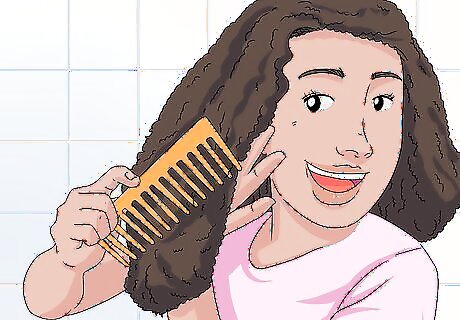
Brush your hair gently with a wide-tooth comb. Pulling at your hair with a round brush, especially while blow drying, can create breakage and even more baby hairs. Instead, use a wide-tooth plastic or wooden comb to gently detangle your hair from tip to root. It’s even better if you can go a day or 2 without brushing it at all, and just use your fingers to detangle it. If you run into a snag while brushing your hair, gently work some detangling serum into the area before attempting to comb it.
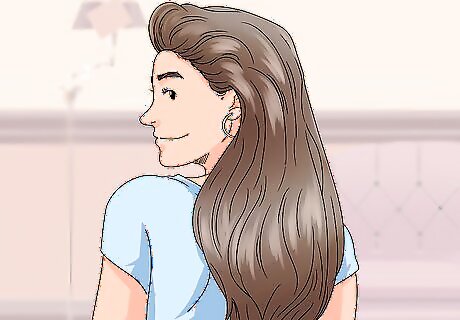
Wear your hair down every other day. If you frequently pull your hair back from your face and secure it with an elastic band, then you might be causing breakage, especially if the ponytail is too tight. Those fine, baby hairs might actually be new growth or broken off pieces. Giving your hair a break by wearing it down minimizes some of the strain on the hair fibers and makes them less likely to split. Check the length of your baby hairs. If they are all different lengths with frayed ends, then breakage may be the culprit.
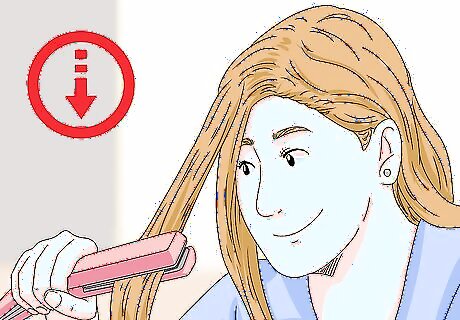
Minimize your use of heat-based styling tools. If you are noticing more and more baby hairs at the front edges of your scalp, then your styling methods might be to blame. Reduce how frequently you blow dry your hair and put your dryer on a low heat setting. Don’t use a curling iron toward the front of your face where the hairs are the most fragile. Examine the texture of your baby hairs. Hair traumatized by heat can appear kinked with frayed ends. When you do blow dry your hair, use a comb to help smooth down your baby hairs. It's a lot harder to grab them with a brush.
Styling Baby Hairs
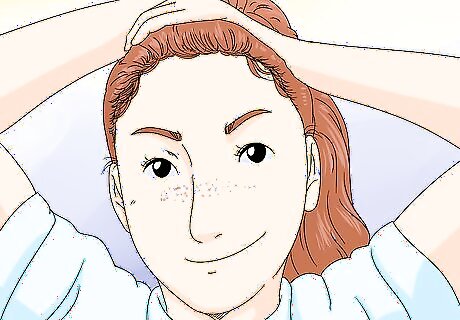
Showcase your baby hairs with a messy hairstyle. Pull your hair up into a loose bun or ponytail, leaving your baby hairs on display. Braid your hair tightly and then run your fingers through it to loosen the strands. This will make your baby hairs look like part of the intended style. The key is to go with loose, natural styles where a number of your hairs are uncontrolled. In contrast, with a tighter, regimented style, any single hair can look out of place.
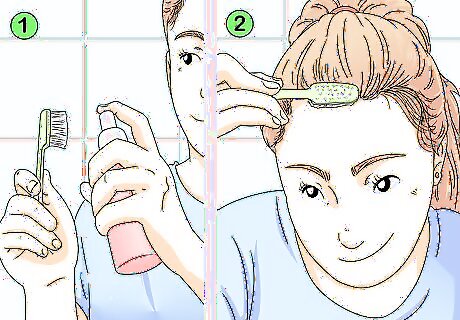
Calm your baby hairs with a spritz of hairspray. Get a new toothbrush and spray the bristles lightly with your usual hairspray. Then, touch the bristles to your baby hairs and apply gentle pressure to lay them down into place. Keep going until all of your baby hairs are where you want them. You can also replace the toothbrush in this method with a piece of folded tissue. The effect is similar and you can toss the tissue when finished. Keep in mind that hairspray may also be damaging and dry out your baby hairs, since hairspray contains alcohol.
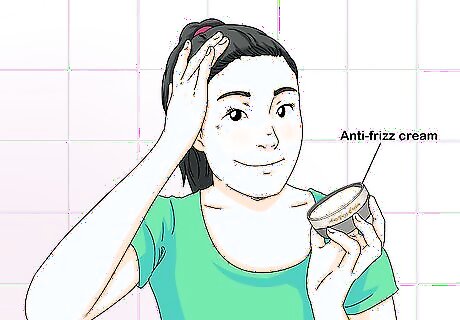
Dab a dime-sized amount of anti-frizz cream on to your baby hairs. This should be a final step after you’ve styled the rest of your hair. Add a bit of an anti-frizz product, such as a pomade or serum, to your fingertips and lightly brush them over your baby hairs. Spread the product out, so that your hairs are secure but not wet looking. You can also use a toothbrush as an applicator for anti-frizz product. The bristles help to create an even application.












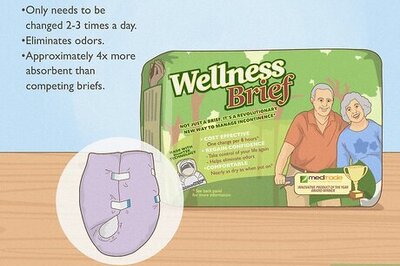
Comments
0 comment